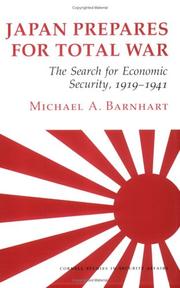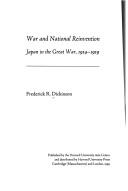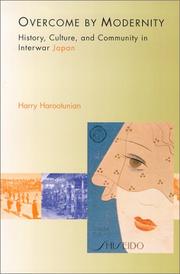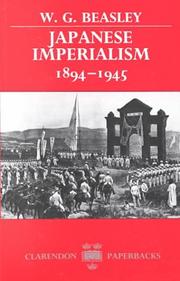| Listing 1 - 10 of 16 | << page >> |
Sort by
|
Book
ISBN: 9789004302624 900430262X Year: 2015 Publisher: Leiden ; Boston Brill
Abstract | Keywords | Export | Availability | Bookmark
 Loading...
Loading...Choose an application
- Reference Manager
- EndNote
- RefWorks (Direct export to RefWorks)
Book
Year: 1928 Publisher: Bruxelles : s.n.,
Abstract | Keywords | Export | Availability | Bookmark
 Loading...
Loading...Choose an application
- Reference Manager
- EndNote
- RefWorks (Direct export to RefWorks)
Book
ISBN: 0300058470 9780300058475 Year: 1994 Publisher: New Haven (Conn.): Yale university press,
Abstract | Keywords | Export | Availability | Bookmark
 Loading...
Loading...Choose an application
- Reference Manager
- EndNote
- RefWorks (Direct export to RefWorks)
Japan --- -Japan --- History --- -Relations --- J4810.80 --- J4810.90 --- J4811 --- J3375 --- Japan: International politics and law -- international relations, policy and security -- Gendai (1926- ), Shōwa period, 20th century --- Japan: International politics and law -- international relations, policy and security -- postwar Shōwa (1945- ), Heisei period (1989- ), contemporary --- Japan: International politics and law -- international relations, policy and security -- world and transregional --- Japan: History -- Kindai, modern -- Taishō period (1912-1926) --- -J4810.80 --- -J3375 --- Relations. --- Relations --- 1868-.... --- Foreign countries --- Japan - History - 1868 --- -Japan - Relations - Foreign countries. --- -Japan - Relations - Foreign countries

ISBN: 0801419158 1322502919 0801495296 0801468469 0801468450 9780801419157 Year: 1987 Publisher: Ithaca (N.Y.): Cornell university press,
Abstract | Keywords | Export | Availability | Bookmark
 Loading...
Loading...Choose an application
- Reference Manager
- EndNote
- RefWorks (Direct export to RefWorks)
The roots of Japan's aggressive, expansionist foreign policy have often been traced to its concern over acute economic vulnerability. Michael A. Barnhart tests this assumption by examining the events leading up to World War II in the context of Japan's quest for economic security, drawing on a wide array of Japanese and American sources.Barnhart focuses on the critical years from 1938 to 1941 as he investigates the development of Japan's drive for national economic self-sufficiency and independence and the way in which this drive shaped its internal and external policies. He also explores American economic pressure on Tokyo and assesses its impact on Japan's foreign policy and domestic economy. He concludes that Japan's internal political dynamics, especially the bitter rivalry between its army and navy, played a far greater role in propelling the nation into war with the United States than did its economic condition or even pressure from Washington. Japan Prepares for Total War sheds new light on prewar Japan and confirms the opinions of those in Washington who advocated economic pressure against Japan.
Japan --- Japon --- Economic conditions --- Economic policy --- History --- National security --- Conditions économiques --- Politique économique --- Histoire --- Sécurité nationale --- J3375 --- J3382 --- J4600.80 --- J4300.80 --- -National security --- National security policy --- NSP (National security policy) --- Security policy, National --- International relations --- Military policy --- Japan: History -- Kindai, modern -- Taishō period (1912-1926) --- Japan: History -- Gendai, modern -- early Shōwa, prewar period (1920s-1945) --- Japan: Politics and law -- history -- Gendai (1926- ), Shōwa period, 20th century --- Japan: Economy and industry -- history -- Gendai (1926- ), Shōwa period, 20th century --- Government policy --- -History --- -Japan: History -- Kindai, modern -- Taishō period (1912-1926) --- -J3375 --- -Japan --- Conditions économiques --- Politique économique --- Sécurité nationale --- Economic policy. --- National security. --- National security - Japan --- Japan - Economic conditions - 1918-1945 --- Japan - History - 1912-1945 --- Japan - Economic policy

ISBN: 0674946553 168417323X Year: 1999 Publisher: Cambridge Harvard university Asia center
Abstract | Keywords | Export | Availability | Bookmark
 Loading...
Loading...Choose an application
- Reference Manager
- EndNote
- RefWorks (Direct export to RefWorks)
J3375 --- J4000.70 --- J4810.70 --- J4820 --- World War, 1914-1918 --- -World War, 1914-1918 --- -European War, 1914-1918 --- First World War, 1914-1918 --- Great War, 1914-1918 --- World War 1, 1914-1918 --- World War I, 1914-1918 --- World War One, 1914-1918 --- WW I (World War, 1914-1918) --- WWI (World War, 1914-1918) --- History, Modern --- Japan: History -- Kindai, modern -- Taishō period (1912-1926) --- Japan: Social history, history of civilization -- Kindai (1850s- ), bakumatsu, Meiji, Taishō --- Japan: International politics and law -- international relations, policy and security -- Kindai (1850s- ), bakumatsu, Meiji, Taishō --- Japan: International politics and law -- diplomatic service and consular systems -- general and history --- Diplomatic history --- Japan --- Foreign relations --- Diplomatic history. --- -Japan: History -- Kindai, modern -- Taishō period (1912-1926) --- -J3375
Book
ISBN: 9781107037700 9781107544970 9781139794794 9781461945185 1461945186 1107472180 9781107472181 1139794795 9781306072311 130607231X 9781107468627 1107468620 1107037700 1107461391 113989269X 110745932X 1107544971 1107465117 1107473195 9781107461390 9781107465114 9781107473195 Year: 2013 Volume: *4 Publisher: Cambridge [etc.] Cambridge University Press
Abstract | Keywords | Export | Availability | Bookmark
 Loading...
Loading...Choose an application
- Reference Manager
- EndNote
- RefWorks (Direct export to RefWorks)
Frederick R. Dickinson illuminates a new, integrative history of interwar Japan that highlights the transformative effects of the Great War far from the Western Front. World War I and the Triumph of a New Japan, 1919-1930 reveals how Japan embarked upon a decade of national reconstruction following the Paris Peace Conference, rivalling the monumental rebuilding efforts in post-Versailles Europe. Taking World War I as his anchor, Dickinson examines the structural foundations of a new Japan, discussing the country's wholehearted participation in new post-war projects of democracy, internationalism, disarmament and peace. Dickinson proposes that Japan's renewed drive for military expansion in the 1930s marked less a failure of Japan's interwar culture than the start of a tumultuous domestic debate over the most desirable shape of Japan's twentieth-century world. This stimulating study will engage students and researchers alike, offering a unique, global perspective of interwar Japan.
J3375 --- J3382 --- Japan: History -- Kindai, modern -- Taishō period (1912-1926) --- Japan: History -- Gendai, modern -- early Shōwa, prewar period (1920s-1945) --- World War, 1914-1918 --- European War, 1914-1918 --- First World War, 1914-1918 --- Great War, 1914-1918 --- World War 1, 1914-1918 --- World War I, 1914-1918 --- World War One, 1914-1918 --- WW I (World War, 1914-1918) --- WWI (World War, 1914-1918) --- History, Modern --- Influence --- Hamaguchi, Osachi, --- 浜口雄幸, --- 濱口雄幸, --- Japan --- Economic conditions --- Foreign relations --- Politics and government --- Influence. --- Arts and Humanities --- History

ISBN: 0691095485 0691006504 1400823862 1283339722 9786613339720 1400814324 9780691095486 9781400823864 9780691006505 9781400814329 140081636X Year: 2000 Publisher: Princeton: Princeton university press,
Abstract | Keywords | Export | Availability | Bookmark
 Loading...
Loading...Choose an application
- Reference Manager
- EndNote
- RefWorks (Direct export to RefWorks)
In the decades between the two World Wars, Japan made a dramatic entry into the modern age, expanding its capital industries and urbanizing so quickly as to rival many long-standing Western industrial societies. How the Japanese made sense of the sudden transformation and the subsequent rise of mass culture is the focus of Harry Harootunian's fascinating inquiry into the problems of modernity. Here he examines the work of a generation of Japanese intellectuals who, like their European counterparts, saw modernity as a spectacle of ceaseless change that uprooted the dominant historical culture from its fixed values and substituted a culture based on fantasy and desire. Harootunian not only explains why the Japanese valued philosophical understandings of these events, often over sociological or empirical explanations, but also locates Japan's experience of modernity within a larger global process marked by both modernism and fascism. What caught the attention of Japanese thinkers was how the production of desire actually threatened historical culture. These intellectuals sought to "overcome" the materialism and consumerism associated with the West, particularly the United States. They proposed versions of a modernity rooted in cultural authenticity and aimed at infusing meaning into everyday life, whether through art, memory, or community. Harootunian traces these ideas in the works of Yanagita Kunio, Tosaka Jun, Gonda Yasunosuke, and Kon Wajiro, among others, and relates their arguments to those of such European writers as George Simmel, Siegfried Kracauer, Walter Benjamin, and Georges Bataille. Harootunian shows that Japanese and European intellectuals shared many of the same concerns, and also stresses that neither Japan's involvement with fascism nor its late entry into the capitalist, industrial scene should cause historians to view its experience of modernity as an oddity.
J4140.80 --- J4000.80 --- J3375 --- J3382 --- Japan: Sociology and anthropology -- cultural history -- Gendai (1926- ), Shōwa period, 20th century --- Japan: Social history, history of civilization -- Gendai (1926- ), Shōwa period, 20th century --- Japan: History -- Kindai, modern -- Taishō period (1912-1926) --- Japan: History -- Gendai, modern -- early Shōwa, prewar period (1920s-1945) --- Civilization, Modern --- Japan --- Civilization --- Western influences. --- Relations. --- Relations --- Occidental influences --- Twentieth century --- J4150.80 --- International relations --- Economic History --- Western influences --- Civilization - Western influences
Book
ISBN: 9780231162180 9780231535069 0231535066 0231162189 Year: 2013 Publisher: New York : Columbia University Press,
Abstract | Keywords | Export | Availability | Bookmark
 Loading...
Loading...Choose an application
- Reference Manager
- EndNote
- RefWorks (Direct export to RefWorks)
In September 1923, a magnitude 7.9 earthquake devastated eastern Japan, killing more than 120,000 people and leaving two million homeless. Using a rich array of source material, J. Charles Schencking tells for the first time the graphic tale of Tokyo's destruction and rebirth. In emotive prose, he documents how the citizens of Tokyo experienced this unprecedented calamity and explores the ways in which it rattled people's deep-seated anxieties about modernity. While explaining how and why the disaster compelled people to reflect on Japanese society, he also examines how reconstruction encouraged the capital's inhabitants to entertain new types of urbanism as they rebuilt their world.Some residents hoped that a grandiose metropolis, reflecting new values, would rise from the ashes of disaster-ravaged Tokyo. Many, however, desired a quick return of the city they once called home. Opportunistic elites advocated innovative state infrastructure to better manage the daily lives of Tokyo residents. Others focused on rejuvenating society-morally, economically, and spiritually-to combat the perceived degeneration of Japan. Schencking explores the inspiration behind these dreams and the extent to which they were realized. He investigates why Japanese citizens from all walks of life responded to overtures for renewal with varying degrees of acceptance, ambivalence, and resistance. His research not only sheds light on Japan's experience with and interpretation of the earthquake but challenges widespread assumptions that disasters unite stricken societies, creating a "blank slate" for radical transformation. National reconstruction in the wake of the Great Kanto Earthquake, Schencking demonstrates, proved to be illusive.
J4219 --- J3410 --- J6580 --- J3375 --- J4000.70 --- Japan: Sociology and anthropology -- social policy and pathology -- emergency services (fire department, ambulance services, disaster relief) --- Japan: Geography and local history -- Kantō region, greater Tōkyō --- Japan: Art and antiquities -- urban planning --- Japan: History -- Kindai, modern -- Taishō period (1912-1926) --- Japan: Social history, history of civilization -- Kindai (1850s- ), bakumatsu, Meiji, Taishō --- Kanto Earthquake, Japan, 1923. --- Disaster relief --- City planning --- Government policy --- History --- Social aspects --- Tokyo (Japan) --- City planning - Social aspects - Japan - Tokyo - History - 20th century. --- Disaster relief - Government policy - Japan - History - 20th century. --- Tokyo (Japan) - History - 20th century. --- Kanto Earthquake, Japan, 1923
Book
ISBN: 9780415625043 9780415401241 9780203862070 0415401240 9781135181628 9781135181666 9781135181673 0415625041 Year: 2012 Volume: 62 Publisher: London: Routledge,
Abstract | Keywords | Export | Availability | Bookmark
 Loading...
Loading...Choose an application
- Reference Manager
- EndNote
- RefWorks (Direct export to RefWorks)
East Asia --- Foreign relations --- History --- J3375 --- J3380 --- J4813.31 --- J4812.10 --- J4810.80 --- Japan: History -- Kindai, modern -- Taishō period (1912-1926) --- Japan: History -- Gendai, modern, 20th century --- Japan: International politics and law -- international relations, policy and security -- Europe -- United Kingdom, Great Britain, England --- Japan: International politics and law -- international relations, policy and security -- Asia -- East Asia --- Japan: International politics and law -- international relations, policy and security -- Gendai (1926- ), Shōwa period, 20th century --- -East Asia --- -Asia, East --- Asia, Eastern --- East (Far East) --- Eastern Asia --- History of Asia --- anno 1900-1999 --- Asia, East --- Far East --- Orient --- Foreign relations. --- East Asia - Foreign relations --- East Asia - History - 20th century

ISBN: 0198215754 0198221681 9780198221685 9780198215752 9780191638619 0191638617 9786613675828 1280698861 0191678473 Year: 1987 Publisher: Oxford: Oxford university press,
Abstract | Keywords | Export | Availability | Bookmark
 Loading...
Loading...Choose an application
- Reference Manager
- EndNote
- RefWorks (Direct export to RefWorks)
Bibliotheek François Vercammen
Imperialism --- Impérialisme --- Japan --- Japon --- Colonies --- History --- Foreign relations --- Histoire --- Relations extérieures --- J3374 --- J3375 --- Japan: History -- Kindai, modern -- Meiji period (1868-1912) -- imperial expansion --- Japan: History -- Kindai, modern -- Taishō period (1912-1926) --- J3370 --- Japan: History -- Kindai, modern period (1868 [1850s]- ) --- History. --- Diplomatic relations. --- Imperialism. --- Imperialismus. --- 1900-1999. --- Geschichte 1894-1945. --- Japan. --- JP / Japan - Japon --- 92 --- Geschiedenis. --- Histoire. --- 92 Geschiedenis. --- 92 Histoire. --- 92 History. --- Geschiedenis --- Japan - Foreign relations - 20th century --- Japan - History - 20th century --- Japan - Colonies - History --- Japan - Foreign relations - 1868-1912 --- Japan - Foreign relations - 1912-1945
| Listing 1 - 10 of 16 | << page >> |
Sort by
|

 Search
Search Feedback
Feedback About UniCat
About UniCat  Help
Help News
News